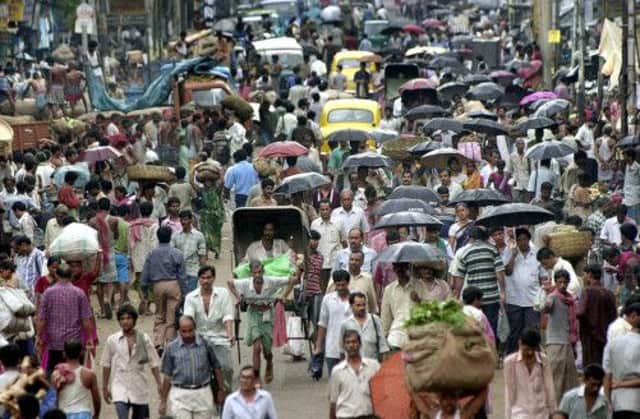Stephan Roman: Time to embrace the ‘new China’


DEMOGRAPHICS and commentators point to South Asia and its 1.6 billion people becoming the “new China” over the next few years, making it a region – embracing Bangladesh, India, Pakistan, Sri Lanka, Afghanistan and Iran – that is undoubtedly of increasing importance to Scotland.
To say the region is characterised by contradictions would be an understatement. On one hand its prospects are hampered by poverty, inequality of wealth and terrorism and security risks – and on the other it is experiencing high economic growth and has the highest growing numbers of internet users worldwide. So, how does Scotland reorient its relations with South Asia and what are the opportunities ahead?
Advertisement
Hide AdAdvertisement
Hide AdWhile the term “special relationship” is overused and open-ended, Scotland does indeed have very close, historical and present day ties to South Asia, particularly in the cases of India, Pakistan and Bangladesh. The diaspora from those countries living in Scotland is significant, and Scotland is thought of highly in the region for its reputation in trade and business, education and the arts. At the same time, there is a lot more Scotland could be doing to firm up the relationships and cultural exchanges with the countries of South Asia that will translate into economic benefit.
The Scottish Government is to be congratulated on its efforts to connect and catalyse the relationships that matter most in South Asia. Through its South Asia, India and Pakistan plans, it has set out ambitious programmes of engagement to establish, develop and strengthen ties. Together with the British Council’s country directors for Pakistan and Scotland, I have been meeting the Scottish Government and other key agencies to discuss how our programmes and initiatives might support Scottish interests in the region.
Through its hosting of next year’s Commonwealth Games in Glasgow, Scotland has a wonderful opportunity to promote Scotland’s cultural, educational and economic assets to a part of the world that is showing signs of being very receptive to what Scotland has to offer.
Looking at education, 1,500 new universities will be created in India alone over the next ten years. That presents a wealth of opportunity for the Scottish higher education system. In the arts, British Council Scotland’s Momentum programme, delivered along with Creative Scotland and Festivals Edinburgh during this year’s Edinburgh Festivals, has already secured the exchange of arts performances and festivals between Pakistan and Scotland.
On the ground, knowledge and experience is critical, and the British Council sees part of its job being to help the Scottish Government and Scottish partners better understand the dynamics at play. Cultural understanding is the key to opening up the region to Scotland’s policy-makers, institutions and businesses. Call it “soft power” or cultural diplomacy, there is no doubt that strengthening cultural relations has been proven to lay the ground for stronger relationships. Culture and education help build trust, a prerequisite for other forms of engagement, such as improving political relations or increasing trade.
We should also be aware that other countries are investing heavily in their cultural relations with South Asia, not least China, and when it comes to the subject of immigration, many in the region do not see us as a friendly port. While we can’t change the immigration policy of the day, we can think about how we put our best foot forward and it’s crucial we play the hand we have to the best of our ability.
I have been asked a lot about Iran in recent weeks, as the country moves its way up the international and news agendas. Although there are still a number of diplomatic hurdles to overcome, there are grounds for optimism in terms of improving the relationship between Iran and the UK. Should this happen there will be significant scope for Scotland to play a part in the thawing of what have been frosty ties with the country’s leadership and its institutions. Scotland has world-leading Persian studies departments at its universities, including St Andrews and Edinburgh, and we met academics and other interested parties last week to discuss ways of working better together on Iran.
The fact that Iran’s president Hassan Rouhani undertook his postgraduate study at Glasgow Caledonian University illustrates the potential for improving relations between Iran and Scotland based on educational co-operation and collaboration.
Advertisement
Hide AdAdvertisement
Hide AdThe numbers at play when it comes to South Asia are staggering. A breathtaking figure is that there are more than one million entrants into the South Asian workforce every month, a rate of supply that is likely to continue past 2020. Almost three-quarters of the region’s population are under the age of 28, a segment of the population that are increasingly city-dwelling, internet-savvy and better educated. There are 400 million young people aged between 15 and 24 seeking education. We are vastly behind the demand curve for supporting this shifting demographic in education, particularly in using the English language as a tool to enable the rising economies of South Asia, through its students and workforces alike, to truly become part of globalisation. Scotland and the rest of the UK can and should be at the forefront of this process.
In doing so we will not only broaden our own horizons, we will also boost our economic prosperity as the socio-economic tectonic plates shift in our 21st-century world.
• Stephan Roman is British Council director, South Asia